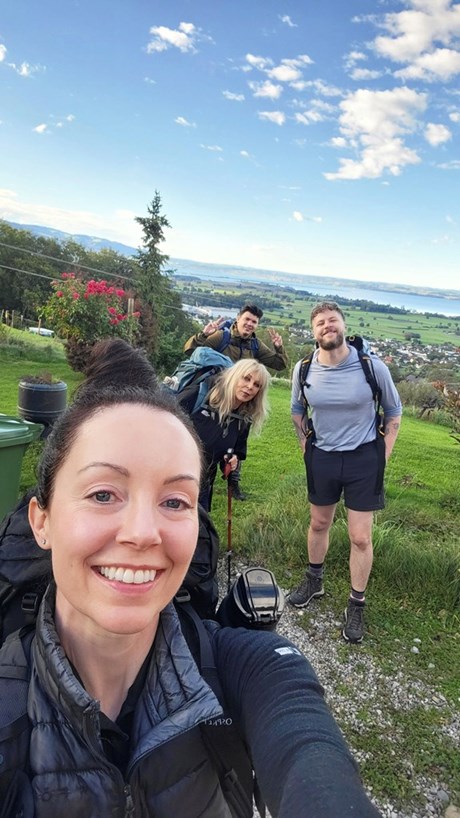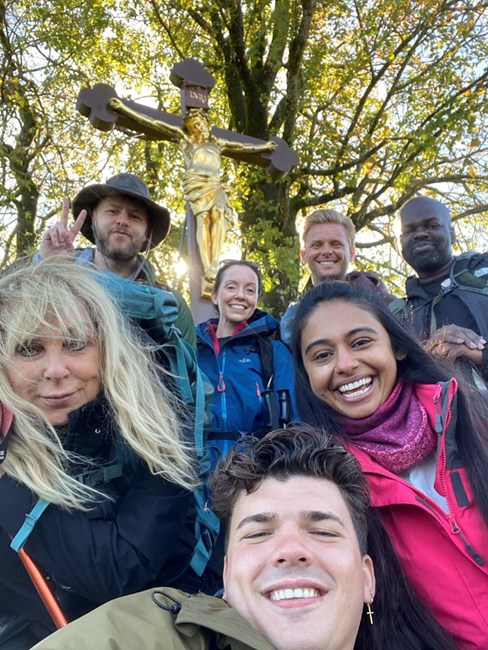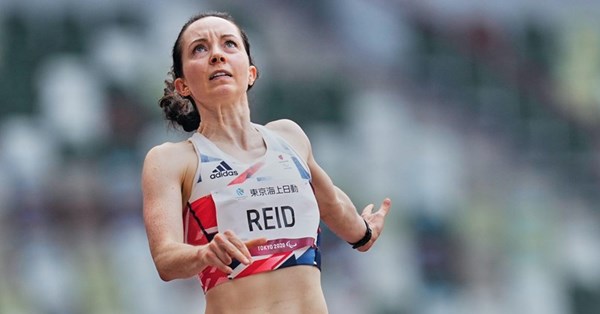ON 29 April, when the roars of supporters fill the route of the London Marathon, some of the cheers will be for the Paralympian Stefanie Reid. She will be fund-raising for the Superhuman Centre, in Ukraine, a facility offering prosthetics and rehabilitation for the country’s 100,000 war-casualty amputees. Having lost her right leg below the knee, at the age of 15, in a boating accident on Lake Scugog, north of Toronto, Ms Reid understands “the BC and AD” nature of life before and after disability.
Before the incident, the teenage Ms Reid had been a sports-mad, A-grade student who hoped to have a career in international rugby. The emotional impact of the accident was amplified by the fact that the boat that injured her was steered by her best friend’s brother, when she was staying at the family’s holiday cottage on the lake.
“It’s hard at 15 when you are desperately trying to find your yourself,” she says. “You just want to fit in, to be normal, and you realise you are never going to be normal again. You’re walking around on crutches, and everybody’s staring. But I now know what a gift it was to learn, that young, what really matters in life, when everything is taken away and stripped back, and you’re asking, ‘If I die at this moment, am I proud of the life I’ve lived?’
“When I was in the ambulance, wondering if I was going to survive, I wasn’t wondering if I was pretty enough, or what did I get in that last test, or if I was popular — it was all about people. How did I treat people, could I have been kinder, what could I have done differently?”
Ms Reid emphasises that the accident was not due to teenagers’ being foolish on a boat — they had a safety briefing every time they went out on the water — and she feels great compassion for the boat’s helmsman. “It was devastating, not just for me. There was a police investigation, and I was not allowed to have contact with my best friend. And it was hard for my friend’s brother.
“For the person it happens to, there’s a lot of support, but it just seemed everybody was really angry with him, but he was really struggling as well. We haven’t necessarily stayed in touch, but I did want to meet with him to say ‘I’m fine. Forgive yourself.’ I wanted to say ‘I’m fine, I’m good, and I want you to move on as well. Please don’t feel like you have ruined my life, because I don’t feel like that.’”
BORN in New Zealand, and raised in Hawaii and Canada by British-born parents who worked in hospitality, Ms Reid does not come from a religious family, although her mother had had her baptised. She attended a Christian high school, as it was the most inexpensive route to a private education.
 BBC/CTVCStef Reid with some of her fellow pilgrims on Pilgrimage: The road through the Alps
BBC/CTVCStef Reid with some of her fellow pilgrims on Pilgrimage: The road through the Alps
Praying to stay alive in the ambulance after being struck by a propellor was the first time that she prayed. Previously, she had understood Christianity intellectually though school, but, in the dark and pain after the accident, faith became personal. Now, she attends Open Heaven church, in Loughborough, part of the Pioneer network of churches. Her husband, the Paralympian wheelchair racer Brent Lakatos, trains at Loughborough University.
Before they married in 2008, Mr Lakatos had asked her out dozens of times, and she let it slip that she was a Christian, hoping to put him off. But, serendipitously, modern-day missionaries had been evangelising in his Dallas apartment complex, organising games nights on Friday nights as a gateway to church, and, far from being put off, Mr Lakatos attended an event, intrigued to find out more. “We have a saying in Christianity: ‘Flirt to convert.’ It happens more than you think.”
Mr Lakatos is still competing; so their Sunday church attendance is sometimes cut short by weekend access to a racetrack of 2.5km of car-free asphalt near by.
“I was just there on Sunday, and I love how diverse it is. That Sunday was a youth takeover; so all our youths literally do the service. They were welcoming us, they were leading the service, giving testimonies. And I was thinking: there aren’t that many places where you have adults who are not their parents investing in young people’s lives, and how important that is. And we have people from all different backgrounds, and people coming through with all different issues, and it’s just one big jumble. That is lovely. It’s what church should be.”
DISCOVERING parasports during her time reading biochemistry at Queen’s University, Ontario, Ms Reid had an 18-year career. Her achievements include winning the World Championship for T44 long jump in 2014, and gaining a silver medal for the same event in the London 2012 Paralympics.
Although she retired from elite sport in 2022, she had already started working as a broadcaster in 2015 when a back injury prevented her competing in the World Championships, and she was offered broadcasting work for the event that she could not participate in. She had grown up never hearing female voices commentating on sport, and so she had never thought about broadcasting as a potential post-athletic career until she was offered that one-day spot. She has since worked on Paralympic coverage for the BBC and Channel 4, and has appeared on Dancing on Ice and Celebrity Masterchef.
 BBC/CTVCStef Reid (third from left) with her fellow pilgrims, just before reaching Einsiedeln Abbey, Switzerland, on Pilgrimage: The road through the Alps
BBC/CTVCStef Reid (third from left) with her fellow pilgrims, just before reaching Einsiedeln Abbey, Switzerland, on Pilgrimage: The road through the Alps
“Communication is one of the trickiest things we do as humans. And it is one of the aspects God has called me to: how do you be a good communicator? Because, for me, that’s just part of connecting people, which is Christianity also.”
This Easter, in the BBC series Pilgrimage: The road through the Alps, Ms Reid is quickly and admiringly branded “the expert Christian” by fellow pilgrims, the journalist Nelufar Hedayat, and the comedians Helen Lederer and Daliso Chaponda.
“I’m very flattered by the term ‘expert Christian’, and I only reject it because it sets up expectations that I’m going to be perfect, and I know I’m not. And people will be disappointed if that’s what they come for. But it’s a conversation I have with myself. If I genuinely believe this, and I genuinely believe that Jesus was the Son of God, and I believe being a Christian means following Jesus, then, if that doesn’t change my life from top to bottom, and totally change the way that I act, then it just can’t be true.”
She continues: “I don’t feel called to be in the Church, but I feel very much called to go out into the regular, normal world, and just do things as I think Jesus would have done. So, what does that look like? I think about it when I’m commentating. How would Jesus commentate? — which is a fun question. Or how would Jesus play sport? It has to penetrate my life, or I’m not convinced it’s genuine. It’s not always going to be in obvious ways, but I do think it should make a difference.”
Ms Reid has taken a year-long course in theology and science at Regent’s College. “For me, faith has to have an intellectual component. My background is as a biochemist, and I had planned to become a surgeon; so intellectual rigour matters. I don’t believe that faith is supposed to be blind. All truth is truth, and they have to converge. If one of them is wrong, then you have to keep searching for that.”
She adores the work of C. S. Lewis. “He is one of my favourites. And Tom Wright has been quite transformative. Tim Mackie I’ve come across recently, and I really enjoy the Bible Project. The thing I’m most inspired by with Tim Mackie is his humility. He is an incredibly smart man, but he doesn’t think he has all the answers.”
She continues: “I’m not going to shout on street corners. Sometimes I think I’m a terrible evangelist because I don’t go up to people saying, ‘Here’s a tract about Jesus!’ It’s not my style. I want to live my life in a way that makes somebody curious, then it invites the question. And, if not, then I will quietly love you, I will support you in the background, whatever you are doing.”
Personal spiritual practices begin for Ms Reid first thing. “One of my non-negotiables is I set aside 45 minutes in the morning. Sometimes I will read the Bible directly; sometimes I’ll read a different book or a different translation. Then, I spend time just writing. My journals are a mix of prayers and thoughts that just come out. Then I can realign myself, and that’s what’s required. I have to constantly talk to God every single day.”
Ms Reid concludes that, with all the decisions to be made in life, and the dreams that she wishes to pursue, the key is: “If God’s not in it, then I don’t want it. I never want to do something that he’s not in, because then it could never be as good as it could have been.”
Pilgrimage: The road through the Alps is on iPlayer.

















